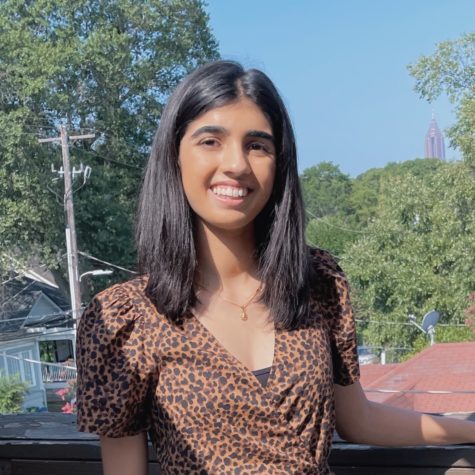The last-minute editorials were worth it
April 28, 2023
My first hands-on exposure to journalism was my Introduction to Journalism class freshman year, taught by the late Jim Sheeler. It was the first class I ever registered for, and I had to email Professor Sheeler to ask him to let me in the class since it was already full. On the very first day of class on Monday morning, Professor Sheeler told us that he lets anyone who asks into the class, which I think sums up the type of person he was: welcoming, especially to those remotely interested in journalism. And it was in this wonderful class that I first heard about The Observer. This farewell article would never have been possible without the passionate and caring Jim Sheeler, and for that, I could never be more grateful.
Even though Professor Sheeler and his class made me want to join The Observer, I had no idea what to expect and no clue what section I wanted to write for. It was on a whim that I started writing for the Opinion section. My very first article was a disaster and even got sent back to me to rewrite—so, I became discouraged, but also incredibly busy with other extracurriculars and ended up taking a hiatus. It wasn’t until Jordan Reif, former opinion editor, reached out to me the next semester introducing herself as a new section editor that I started writing again. Then COVID-19 hit, and I had nothing better to do other than write.
And I wrote. I wrote about TikTok (which is such a cringe-inducing article that Sara Khorshidi, my director of print, commented on as copy editor at the time), “Avatar: The Last Airbender,” lack of diversity in literature, sexual assault allegations and much more. The more I wrote, the more I felt as if I had a voice—as cliché as it sounds. More importantly, the more I wrote, the more I grew as a person and a writer. Even though I couldn’t see that growth and change in myself at the time, Jordan did, and she encouraged me to apply to be the next opinion editor. Although, I applied for the position flippantly, thinking I wouldn’t get the position nor that I actually wanted it. But lo and behold, I got the position, accepted it and thus began the next two years of my life in this role.
Even though I may have been unserious about applying for opinion editor, I was incredibly nervous going into my first production night. I had no idea what I was doing—it took me hours to edit a single article, I knew absolutely no one on the editorial board and my first editorial lacked any real direction. It wasn’t until my third production night that I had unknowingly found the drive for the editorials: criticizing Case Western Reserve University. “Editorial: Case For Life is a danger to the student body” is the editorial that started it all. The editorials, such as “President Kaler’s false positivity is not needed at CWRU” or “Valentine’s Day should make us consider existing sexual assault culture at CWRU,” are ones where I’m definitely condemning the university. But on a more serious note, these editorials are not just ones I write on behalf of my fellow editorial board members, but ones where I wanted to be a voice for the student body. It’s through these editorials, despite writing them during production nights (sorry to the copy editors), that I developed my voice not just as a writer, but as an advocate. Writing for this campus newspaper has made me recognize my obligation to listen to and convey diverse voices and perspectives. I strived to articulate the concerns of the university community, and I hoped my fellow students, not just readers, felt seen.
However, if it weren’t for the people on the editorial board, I wouldn’t enjoy production nights or even my college experience nearly as much. If it weren’t for being opinion editor, I would never have met executive editor Shreyas Banerjee, the person who I can always make fun of and my coffee-shop buddy. Or social media editor Sophie Popkin, the person who can always make me laugh and my Midwestern goodbye buddy. Or Ritika Devarakonda, the person who always sounds a little too concerned for my well-being and my spontaneous dinner buddy. I could name so many more people that have made my time at The Observer (Joey Gonzalez, Puneet Bansal, Shifra Narasimhan and Shivangi Nanda all deserve a shoutout) memorable, but the point is, The Observer hasn’t just been impactful in finding my voice, but also in finding my people.
While writing is involved in other parts of my life, such as with my love for creative writing or my job at the Writing Resource Center, seeing that my words in each week’s printed paper could have an impact on this community—even if it’s just one student feeling validated—is what continued to motivate me to write not only for myself, but for others. The Observer is a place where I’ve learned that no voice is ever the same, but that every voice deserves to be heard. I’m thankful I’ve been able to share mine and those of others around me. So, in true me fashion, I’m signing off my very last article in the late hours of production night at exactly 2:22 a.m.



